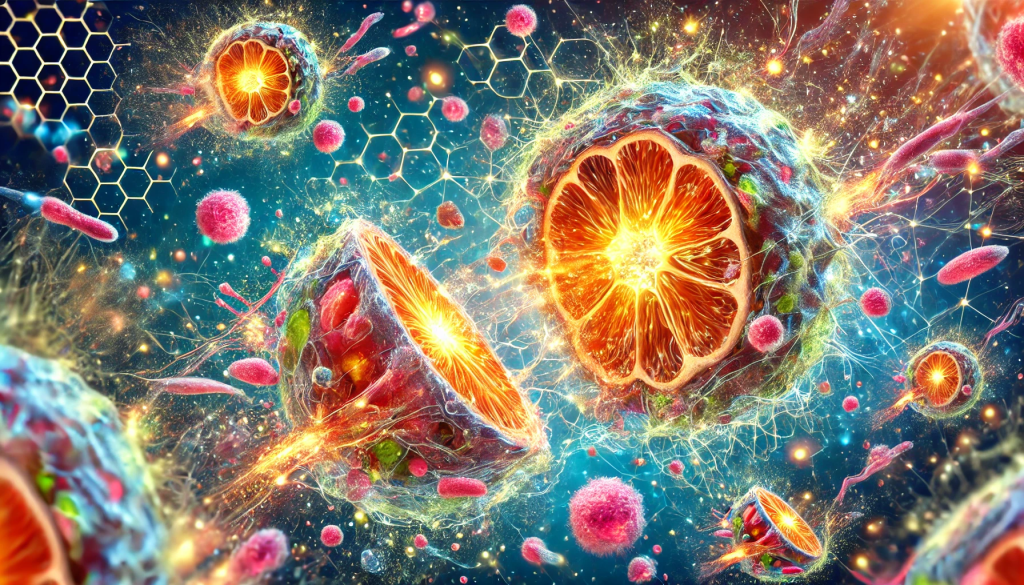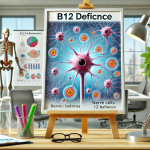Autophagy is a natural process in the body where cells cleanse themselves of damaged or unnecessary components, such as proteins and organelles. This mechanism helps maintain cellular health and plays a crucial role in slowing down aging processes and preventing diseases. In this article, we will explore what autophagy is, how it works, and why it is important for health.
1. How Autophagy Works
Autophagy is triggered when cells experience stress, such as nutrient deprivation or intense physical activity. The body uses specialized structures called autophagosomes to isolate and break down damaged parts of the cell. This process generates useful molecules that are recycled to restore energy and create new cellular components.
2. Benefits of Autophagy

- Slowing Aging: Autophagy removes cellular damage, slowing aging and improving cell function.
- Boosting the Immune System: The process clears cells of pathogens, enhancing the body’s resistance to infections.
- Preventing Diseases: Autophagy plays a critical role in preventing diseases such as neurodegenerative disorders (e.g., Alzheimer’s disease) and cancer.
- Improving Metabolism: It helps normalize blood sugar and lipid levels, important for preventing diabetes and obesity.
3. How to Stimulate Autophagy

- Intermittent Fasting: The most popular method to activate autophagy. Fasting periods of 12 to 16 hours can stimulate this process.
- Physical Activity: Regular exercise triggers autophagy and improves overall body condition.
- Caloric Restriction: Reducing calorie intake is another effective way to activate autophagy.
- Antioxidants and Nutrients: Foods rich in antioxidants (green tea, turmeric, berries) help protect cells and support autophagy.
4. Risks and Limitations
While autophagy has many benefits, excessive fasting or overloading the body can negatively impact health. Always consult a doctor before starting practices aimed at activating autophagy.
Autophagy: The Body’s Cellular Recycling System
Autophagy, derived from the Greek words “auto” (self) and “phagy” (eating), is a crucial biological process that helps maintain cellular health and overall homeostasis. It is often described as the body’s natural recycling system, where cells break down and remove damaged or unnecessary components, such as proteins, organelles, and other cellular debris. This process not only clears waste but also provides the cell with raw materials for repair and energy production, making it essential for survival and optimal functioning.
At its core, autophagy is a highly regulated process that protects cells from accumulating harmful byproducts of metabolism and stress. It plays a vital role in cellular quality control by identifying and degrading dysfunctional or damaged components, preventing them from causing harm. This mechanism is especially important in the context of aging, where the efficiency of autophagy tends to decline, contributing to the accumulation of cellular damage and the development of age-related diseases.
The process of autophagy involves the formation of double-membrane vesicles called autophagosomes. These vesicles engulf the targeted cellular components and then fuse with lysosomes, specialized organelles containing enzymes that break down the engulfed material. The resulting molecules, such as amino acids, lipids, and sugars, are then recycled for energy production or used to synthesize new cellular components. This cyclical process ensures that cells can adapt to changing conditions and survive periods of stress or nutrient deprivation.
Autophagy is not a passive process; it is activated in response to specific signals. For example, nutrient deprivation is a powerful trigger. When cells experience a shortage of nutrients, autophagy is upregulated to recycle intracellular components and sustain energy levels. This adaptive response is crucial during fasting or starvation, allowing the body to maintain essential functions even in the absence of external energy sources.
One of the most exciting aspects of autophagy is its role in preventing disease. By removing damaged organelles and proteins, autophagy helps protect against a variety of conditions, including neurodegenerative diseases, cancer, and infections. In neurodegenerative disorders like Alzheimer’s and Parkinson’s, the accumulation of misfolded proteins is a hallmark feature. Autophagy plays a protective role by clearing these toxic aggregates, potentially slowing disease progression. Similarly, in cancer, autophagy can have a dual role: it can suppress tumor development by preventing the accumulation of damaged DNA and organelles, but in established tumors, cancer cells may exploit autophagy to survive in nutrient-poor environments.
Autophagy also has a significant role in immunity. During infections, cells can use autophagy to engulf and degrade invading pathogens, a process known as xenophagy. This serves as a first line of defense, limiting the spread of infection and supporting the immune system’s response. Additionally, autophagy aids in the presentation of antigens, helping the immune system recognize and target pathogens more effectively.
In recent years, there has been a surge of interest in the relationship between autophagy and lifestyle factors, particularly fasting and exercise. Fasting has been shown to stimulate autophagy by creating a nutrient-deficient state that prompts cells to initiate the recycling process. Intermittent fasting and prolonged fasting are particularly effective in enhancing autophagy, which may contribute to their potential health benefits, such as improved metabolic function and longevity. Exercise is another powerful activator of autophagy, especially in muscle cells, where it helps repair damage and adapt to physical stress.
While autophagy is beneficial, its dysregulation can lead to various health issues. Excessive or insufficient autophagy has been linked to diseases such as cancer, neurodegeneration, and autoimmune disorders. For example, excessive autophagy can lead to the degradation of essential cellular components, while insufficient autophagy can result in the accumulation of damaged organelles and proteins, disrupting cellular function.
In the context of aging, enhancing autophagy is a promising strategy for promoting longevity and preventing age-related diseases. Researchers are exploring pharmacological agents that can mimic the effects of fasting or exercise to stimulate autophagy. Compounds like rapamycin and spermidine have shown potential in preclinical studies for boosting autophagy and extending lifespan. However, these interventions require careful evaluation to avoid adverse effects, as autophagy needs to be tightly regulated for optimal benefits.
Autophagy is also being studied for its role in metabolic health. Conditions like obesity, diabetes, and fatty liver disease are often associated with impaired autophagy. Restoring autophagic activity in these contexts may help improve metabolic function and reduce disease risk. Similarly, autophagy’s role in clearing damaged mitochondria, a process called mitophagy, is critical for maintaining energy production and preventing oxidative stress, both of which are key factors in metabolic diseases.
In conclusion, autophagy is a fundamental process that underpins cellular health and adaptability. By recycling damaged components, it ensures the efficient functioning of cells and protects against a range of diseases. From its role in aging and immunity to its potential as a therapeutic target, autophagy is at the forefront of scientific research, offering insights into how our bodies maintain balance and resilience. As we continue to uncover the intricacies of this process, autophagy may hold the key to unlocking new strategies for promoting health and longevity.

















I’m also commenting to let you understand what a excellent discovery my cousin’s princess obtained viewing the blog. She mastered such a lot of things, which include what it is like to have an excellent helping style to let many people just master chosen very confusing subject matter. You really exceeded visitors’ desires. I appreciate you for coming up with these productive, healthy, explanatory as well as unique guidance on that topic to Kate.
Thankyou for this post, I am a big big fan of this internet site would like to continue updated.